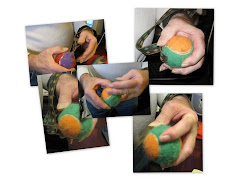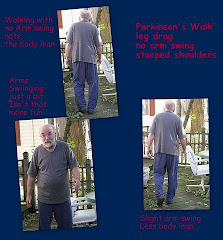Since 2000 a number of studies have indicated that drinking at least 100 mg of caffeine everyday might reduce the incidence of Parkinsons disease. 100 mg isn't much caffeine, about the amount in an espresso.
Studies show that men who drink no coffee at all are five times more likely to develop Parkinsons. Other tests demonstrated that caffeine protected mice from attempts to induce Parkinson's. In 2001 additional testing on mice at Massachusetts General Hospital by Michael Schwartzchild disclosed that caffeine appears to prevent the loss of dopamine, the depleted neurotransmitter in PD by rendering the A2A receptor inactive which seemed to prevent further deterioration.
Caffeine seems to help protect brain cells from Parkinsons disease, a disease that causes progressive speech and motor difficulties. Other sources of caffeine: teas, chocolate and cola drinks showed similar results.
Besides being a stimulant, caffeine has other effects. It blocks two receptors in the brain, one of which helps us go to sleep and the other as identified by different research has a role in inflammation and Parkinson's.
Why caffeine affects patients differently is unknown. Whether caffeine can slow the progression of PD as well as prevent it is also not known. In a very recent study from the Mayo Clinic 1208 subjects were studied for lifetime coffee drinking history. The study targeted two genes one of which encodes the caffeine receptor activity and the other the rate-limiting process of caffeine metabolism. The results of the study were inconclusive.
Another study shows that caffeine protects men from Parkinson's but not women. A study at Harvard School of Public Health showed that post menopausal women who took HRT (Hormone Replacement Therapy) and drank more than five cups of coffee a day were one and one half times more likely to develop Parkinsons than heavy coffee drinkers who weren't on HRT. Women who drank only a little coffee and took HRT were 65% less likely to develop Parkinsons.
There has been at least one study which demonstrated that women who have had both ovaries removed signficantly increased their chances of developing Parkinson's by 50%. There appears to be a link to natural estrogen as a protector.
A study by Tel Aviv University failed to show any neuroprotective effect from caffeine in men or women.
From the Journal of the American Medical Asociation comes the 30 year result of a Honolulu Heart Program study from 1965-68 of 8004 Japanese-American men. The conclusion was that the higher coffee (at least 28 oz a day) and caffeine consumption significantly reduced the incidence of age-related PD.
In a study at Duke University Movement Disorders Center it was determine that in families predisposed to have Parkinson's Disease, those who were serious coffee drinkers and also smoked appeared to be less likely to develop PD.
Looks like I picked the wrong year to cut down my coffee intake.
Scientific American 5-08-01 Health
Science Daily 4-10-07
JAMA 5-24-00














I am a PhD student and working on A2a receptor antagonists for PD treatment. Its really an appreciable and interesting approach about the role of caffeine in PD treatment. I had also used caffeine as reference in my in vivo studies. So, the report is really encouraging for me to validate my studies with the new A2a receptor antagonists.
ReplyDeleteI am sure that you have already seen this study but I am including a few links which might be helpful:
ReplyDeletehttp://www.ncbi.nlm.nih.gov/pubmed/18759349
http://www.sciam.com/article.cfm?id=caffeine-may-protect-agai
http://www.sciam.com/podcast/episode.cfm?id=D81D86BC-E7F2-99DF-30793EC0DF084680
Best Wishes
Interesting post. Myself, I have young onset PD, but certainly not for a lack of caffeine. I often joke that my lab tests always show that I have a trace of blood in my Coca-Cola stream.
ReplyDeleteMy comment is a question: Can early symptoms of PD be confused/misdiagnosed as epileptic symptoms e.g. physical fits in which the body goes rigid, the persons mind becomes frantic?
ReplyDeleteWe suppose that someone unfamiliar with either condition could confuse an eipleptic seizure with Parkinson's tremors but we don't think that is your question. There are Parkinson's disease seizures which can by caused by orthostatic hypotension. A drop or sudden increase in vaso pressure, change in sodium levels can cause such a seizure which could very well be confused with an epileptic seizure. A similar condition is Multiple Systems Atrophy.
ReplyDeleteThere are some similarities in the conditions themselves. Both conditions are due to an imbalance in nerve signalling. Although in the case of the excitatory neurotransmitters in epilepsy it is believed that there is an excess possibly of GABA, gamma-amniobutyric acid, or if glutamate. In Parkinson's it is the deficiency of dopamine and a normal amount of acetylcholine which creates the imbalance.
Both conditions share a common area of investigation in glutamate. And both share a possible trigger by stroke of serious
head trauma. Both share research into cell membranes and the electrical impulses which travel between neurons. And both may share a commonality in the fact that changes may stem in glial cells (non-neuronal cells) which regulate the chemicals that control signaling. While the affects may not be the same, some of the chemistry and the electrical impulse issues may be similar.
In the early stage of Parkinson's the tremors are usually unilateral which means there would be little chance to confuse the two and of course, seizures are not common. In the latter stages of PD, seizures are not uncommon.
Anyone who suffers from seizures should wear a bracelet with as much information as possible including contact parties.